Fire Emblem: The Sacred Stones
With time comes relationship perspective.
They say that true love is blind. Who "they" are can be a sub-quest for later. For now, let's consider the second bit of that sentence - and let me bash myself round the head with it sufficiently that I can write about Fire Emblem: The Sacred Stones without glossing over some of its weightier flaws. Because, love it as I do, I have to admit that it's more of an acquired taste than I first thought - back when I stumbled giddy and excited out of the back-end of the first Western instalment in the strategy-RPG series last summer.
See, it's a wonderful thing, Fire Emblem. But it's got issues. And given that most of them were issues last time around too, it's probably fair to frown and admit they're innate. That said, this is also a good opportunity to point out that people who liked the last one - confusingly named "Fire Emblem" here despite there having been more than a handful of previous instalments in Japan - will quickly fall in love with this one again, just as soon as they get over it being the same thing with a different story, a bolted-on multiplayer mode, and some arguably superficial changes to the structure of the campaign.
Why the love, then? Well, it's not a quick answer.
Fire Emblem is a turn-based strategy role-playing game that works along similar lines to developer Intelligent Systems' other GBA series, Advance Wars, but puts a much greater emphasis on the narrative, and in-game character development and diversity. It hooks you in through a mixture of traditional Japanese RPG story stylings and finely tuned strategy design. The Sacred Stones is the same thing, really. Think of it as what Advance Wars 2 was to Advance Wars and you can't go too far wrong.
Each mission, or "chapter", is played out on a map overlaid with a grid of squares. Things like bridges, walls and houses take up squares, and rivers, forests, mountain ranges and fortifications snake along occupying various squares, some of which are out of bounds as a result. Your goal is to control a motley band of adventurers hewn from the ranks of various armies, mercenary groups and the like and direct them to mow down a bevy of bad guys and monsters whilst under severe duress.
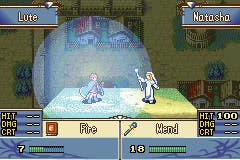
Each turn, you get to move each of your units and then opt to attack if within range, use an item, trade with your principal unit who holds the keys to the supplies or with local merchants, or use some specialist magic - perhaps a "Mend" spell to heal up one of your allies. When attacking, you can generally land a single blow, receive one back, and then sometimes land another. When being attacked on the enemy's turn, you receive one, then get to land another, and depending on your respective stats there may be no more fighting, or one of you may land another blow.
It's all governed by a range of stats - luck, weapon-skill, attack, defensive, etc. And there are various factors to take into consideration, like the effectiveness of certain units in certain situations. Pegasus Knights, for example, are very susceptible to damage from archers. Another consideration is the weapon and magic triangles, which govern the effectiveness of certain attacks against others. These work in a paper-scissors-stone manner - axes are strongest against lances, lances against swords, swords against axes, and similar for magic.
And of course you have to consider the terrain underfoot, changing weather conditions that may bog down your mounted knights, and the importance of unit positioning at the end of a turn - making sure that wounded units are either shielded from or simply not within range of enemies, whose movement ranges you can establish by clicking on them.
There's a lot going on - far more than I've detailed here, in fact. Fortunately it's all introduced gently through the first few levels of the campaign - with an option for experienced types to play on more challenging difficulty levels that strip out the handholding.
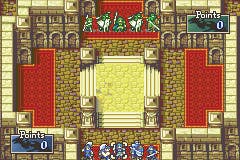
However, this being a role-player, there's a proper emphasis on storytelling and individual units - or rather units as individuals - on top of all that. Your characters all have names, identities, and individual roles both in mission and narrative terms. All collect experience for each battle and level up with each filled experience bar, upping their health points and other stats incrementally, and it's also possible to shift high-level units into new character classes that modify their skills and weapon affinities to a greater degree. This mixture of RPG and strategy game, I love.
Aha, but. This RPG element is also responsible for two of the most divisive things about the whole series: permanent character death, and potential allies on the other side of the conflict. If Fire Emblem were a knight on horseback, potential allies would be spiked walls to jump, while perma-death would be a downpour of poison-tipped lances. In other words, you need to be wearing a certain amount of emotional armour to withstand the pain they're capable of heaping upon you.
It's odd that permanent character death is an odd concept. You wouldn't expect a character-driven game to let you continue if your main character died, even if it let you do so without some of the second-tier types. Fire Emblem treats us like this too, stopping things point blank if one of your principle units dies, and letting you continue without some of the second-tier types. The difference is that if a secondary character dies in Fire Emblem, that's it. No unheralded return to the selection screen between battles with a single health point, no Phoenix Down; just no more of them.
In other words, you either have to soldier on for the rest of the game without them, or you have to turn off the GBA, turn it back on, and restart the chapter. Cunningly, the game auto-suspends the state of play more or less constantly, so it's impossible to resume a chapter and not see the same death play out in the same way if you screw up.
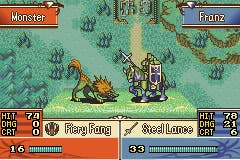
You can see why this might piss people off, especially as some chapters can take literally an hour to finish. For those of us who like to play things thoroughly, it's like getting to the end of a first-person shooter level and realising you've missed out on the Gun That Kills Everything In The Game And Is Only On This One Level. Or quick-saving at the point just prior to unexpected death. It's one of those things, and it's a feature.
A lot of people don't think it's a very good feature. A lot of people hate it. I happen to tolerate it, because Fire Emblem is magical in so many ways that I'm prepared to accept its occasional malevolence. Maybe it's a domestic abuse scenario - perhaps, on some level, I feel bad about that time I was playing Fire Emblem on the loo on my old GBA, watched a chap called Marcus perish and threw my handheld... into the bath.
As a result of all this perma-death, you will rarely complete a chapter in one fell swoop. So often it's a case of restarting missions repeatedly, or feeling them out the first time through to decide which units you can afford not to bring into battle - or mustn't for fear of losing them.
Then there's the befriending-enemies aspect. This is actually one of my favourite things about Fire Emblem, but it's simultaneously another knife-edge issue. The idea is that when you see an enemy or NPC involved in a story sequence prior to a chapter, you can generally seek them out on the map with a particular unit, stand next to them and use the "Talk" command to encourage them to rally to your cause instead. In this way you can beef up your party no end.
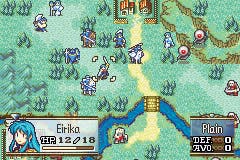
On the other hand, if you don't talk to them by the end of the chapter or, worse, they fall by your sword because they attacked a particularly fearsome unit of yours that you'd haplessly positioned just within range, you won't ever get the opportunity again. And some of them are fiendishly difficult to ensnare. Naturally when you don't you tend to restart the chapter, or just continue on without them - only to really miss them later when the going gets tough. Incredibly tough.
Even so, it's incredibly compulsive - and not just because I feel guilty about throwing it in the bath. On the one hand, the storytelling is wonderful. Characters have names like Ephraim, Eirika and Myrhh, and the story this time is more exotic, a tale of political and family friendships torn asunder by the influence of dark forces, the rise of malevolent military types, confused allegiances on the front lines and upheaval across a continent, borne out in flowery dialogue drawn out on top of lovely hand-drawn static backgrounds. Anybody who finds it easy to fall under the spell of grandiose tales of worlds in peril and brave adventurers seeking to unburden them of said peril will love it. And the way the storytelling and character development is woven into the design of each playable chapter is ingenious.
And on the other hand, the strategy and the levels designed to eke it out are very cleverly put together. The further you get the more extreme the pressures. As well as doing simple things like protecting your Pegasus Knights and Clerics, or perhaps choosing not to deploy them, choosing units to visit nearby villages for supplies and tips, and making sure your attacking units aren't over-exposed at the end of their turn, you have to think about subtler issues like which units best complement each other, and the progression of your weaker characters. If you don't field them, they don't grow in experience. This can be an issue in itself for some players, but with a bit of thought you learn to have them chip in on enemies with depleted health bars, finishing them off for big boosts in experience.
So in the end, Fire Emblem: The Sacred Stones really is what Advance Wars 2 was to Advance Wars. The majority changes aren't central to the game, and consist of a greater slant toward ethereal monsters earlier on, a few new classes, a world map that you navigate manually allowing you to return to areas like demon-held citadels and forests infested with giant spiders to test your mettle and level up characters (think of the colosseums in Fire Emblem, but standalone and from earlier on), and more branching off with different parties. It's still the same thing, but the new story and its inherent compulsiveness save it from being slagged off on that level.
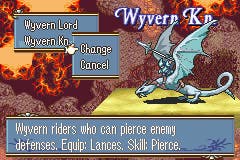
The exception here is the multiplayer Link Arena, which allows you to square your chosen band off against a real-life friend's without running the risk of losing your characters in the single-player game. This works as you might imagine, but it's a bit noughts-and-crosses esque and tends to hinge on one player's first mistake rather than particularly cunning tactics.
The problem with this being the series' Advance Wars 2, then, is that there was less wrong with Advance Wars to begin with than there was with Fire Emblem. It suffers because of tradition - with overlong animations, however endearing, on the battle screen; the need to complete obvious movements for characters manually, or waste several turns dragging unthreatened units across the map to critical points; the need to repeat missions many times in order to complete them, usually because you weren't to know which units you needed to befriend NPCs, or because you let your concentration slip for one move of one turn and someone perished as a result.
And you know what? It's lost something else, too. I'm no longer in it. Fire Emblem had you as a travelling tactician, bound to the party by ties of burgeoning friendship, and that made it all the more lovable. The characters here are just as endearing, but the loss of your role as observer weakens the bond slightly.
Much as I love it, I can't let it get away with all of that. If you can't, you'd be better served by Advance Wars, or perhaps Final Fantasy Tactics Advance. However, if you reckon you can love it for the reasons I've given, then please join my party. This is just as beguiling as the first Emblem; but while it's still true love, I'm getting to the stage where we nag each other, and get fed up with each other's little idiosyncrasies.








